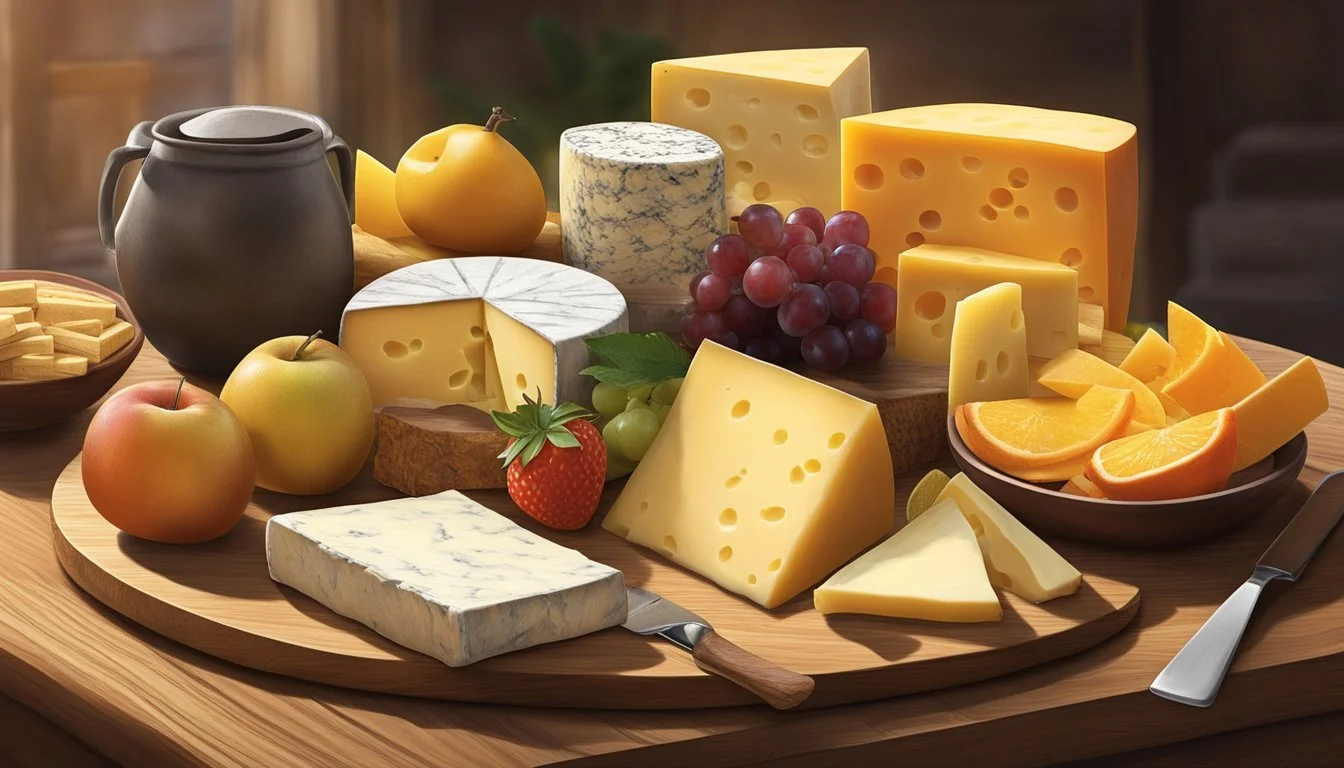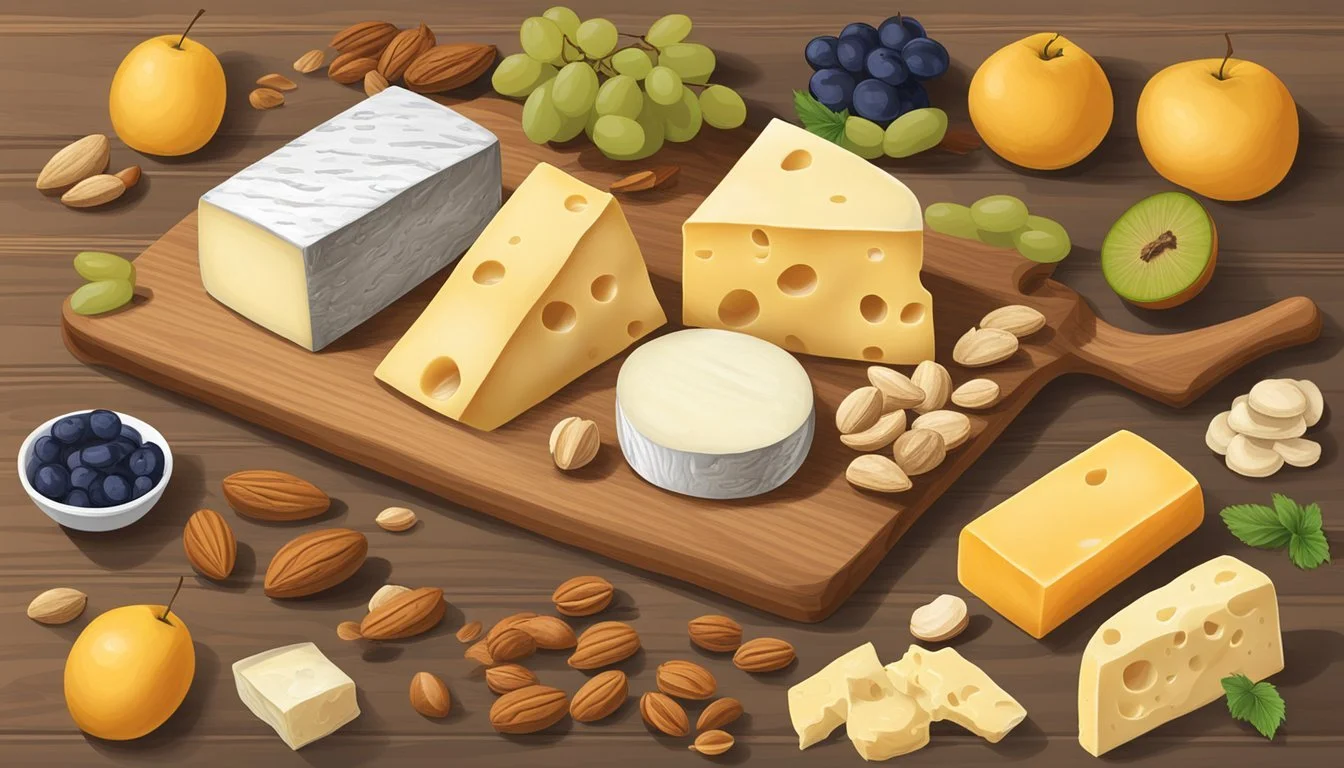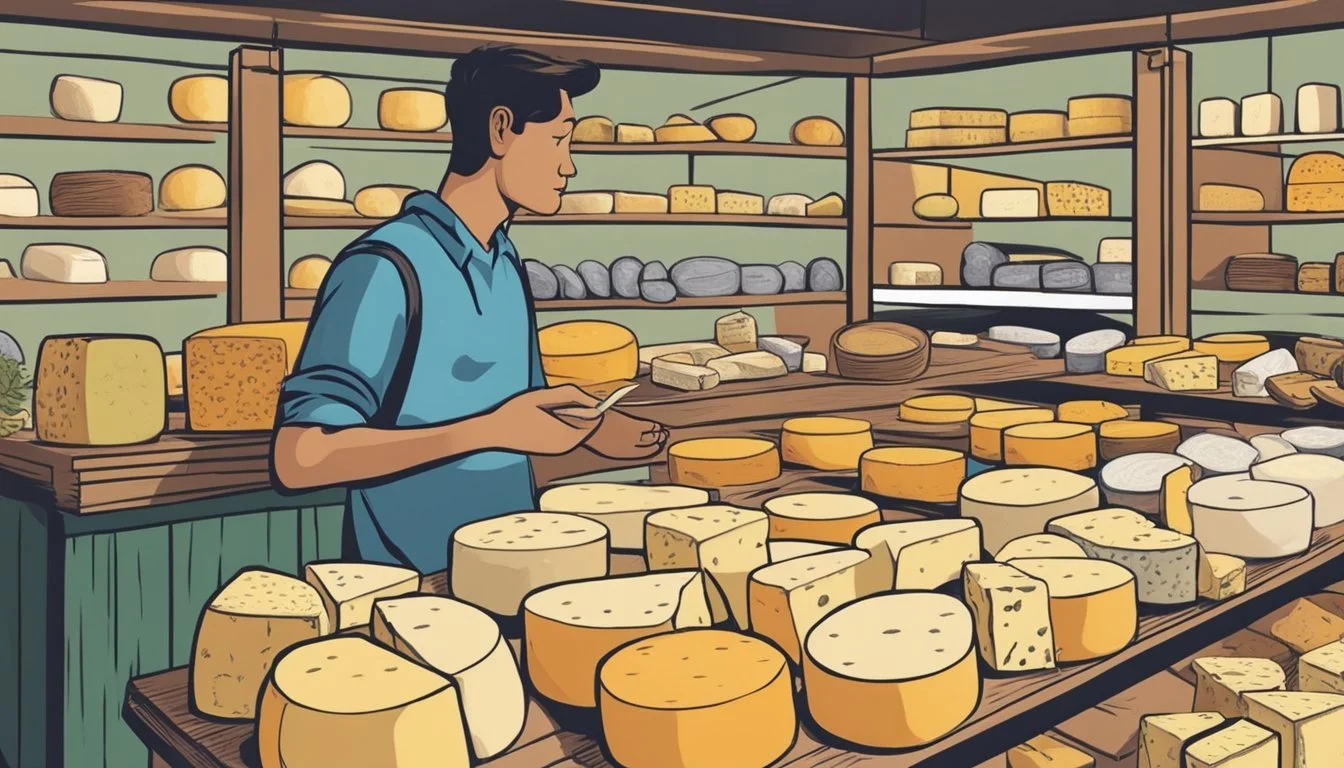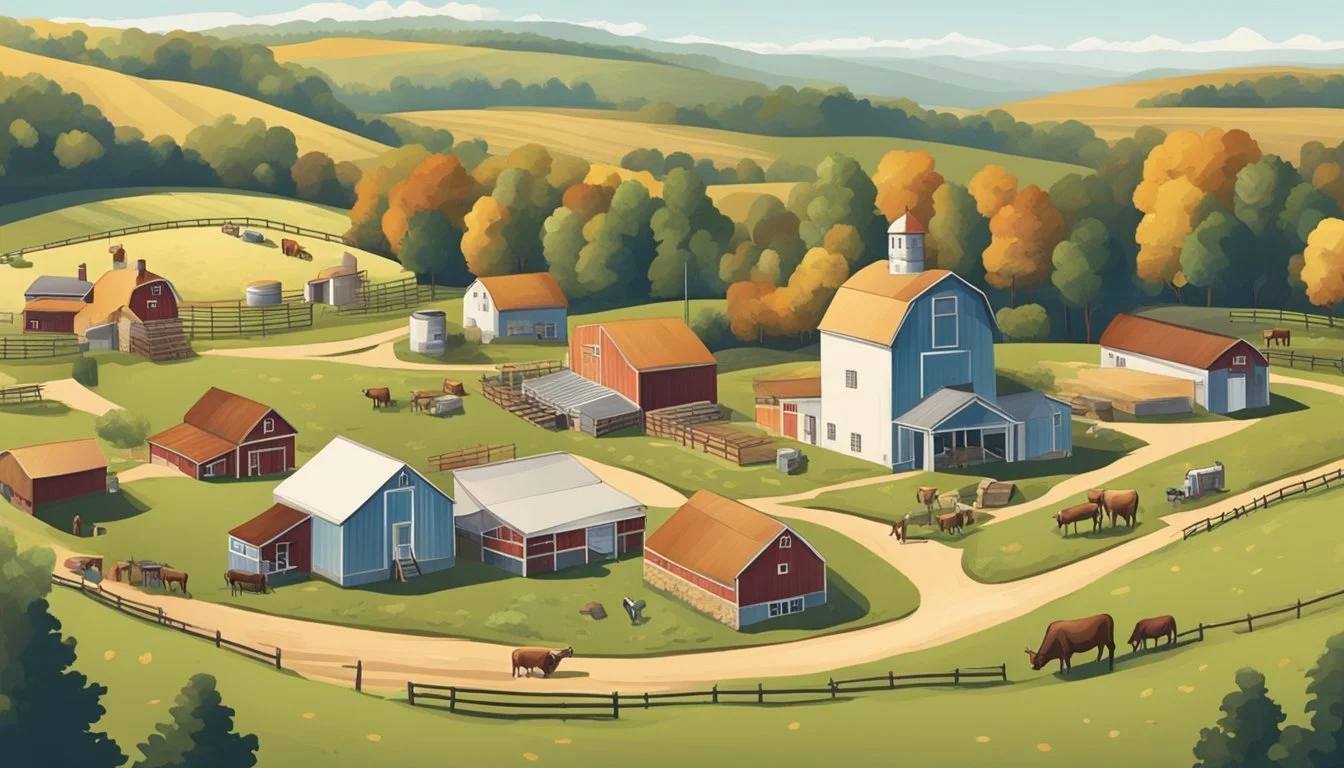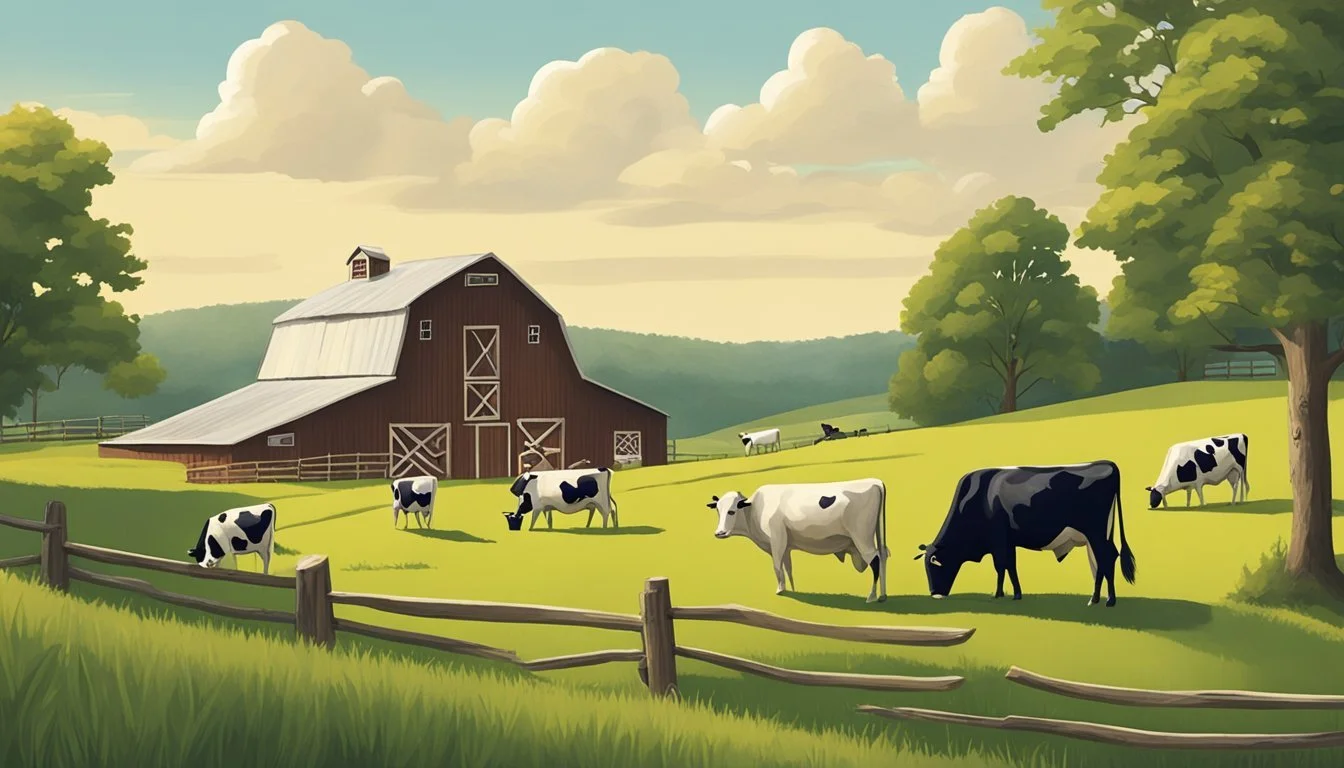Pennsylvania Artisan Cheese
A Guide to the State's Finest Cheeses
Pennsylvania stands as a prominent figure in the artisan cheese (how long does cheese last?) industry, offering a diverse selection of high-quality, handcrafted cheeses (What wine goes well with cheese?). Local cheesemakers exhibit a steadfast commitment to traditional methods, often using milk from neighboring farms to create their cheese. The artisanal craft in Pennsylvania is notable for its cave-aged varieties, leveraging the state's unique climate to develop complex flavors and textures. These cheeses contain the essence of the region's terroir, which is expressed through the distinct characteristics of each variety from cheddars to Camemberts.
Small-batch production is a hallmark of the Pennsylvania cheese scene, ensuring each product retains its unique taste profile. By maintaining a close connection to the source of their milk—frequently partnering with Amish dairy farmers—artisan producers are able to ensure a level of freshness and quality that is difficult to match on a larger scale. This commitment to artisanal methods extends beyond just cheese, with some producers offering additional farm-to-table products such as grass-fed beef and raw milk, reinforcing the local agricultural ethos.
The Pennsylvania cheese guild and various creameries across the state not only contribute to the abundance of distinctive cheeses but also support the local economy and sustainable farming practices. Their products, ranging from robust washed rind cheeses to delicate Goudas, are a testament to the region's rich agricultural heritage and innovative future. As they continue to craft cheeses that are both traditional and inventive, Pennsylvania secures its place as a leader in the artisan cheese movement.
History of Pennsylvania Artisan Cheese
Pennsylvania's connection with cheese-making traces back to its early settlers. When German immigrants, notably the Pennsylvania Dutch, established themselves in the state during the 1600s, they brought with them their rich dairy farming traditions. These traditions have deeply influenced the development of artisan cheese in the region.
The dairy industry in Pennsylvania flourished throughout the centuries, laying a strong foundation for artisan cheese-making. The state's commitment to traditional techniques has been preserved through generations, lending Pennsylvania cheese its distinctive character.
Key Milestones in the History:
1600s: German immigrants introduce dairy farming and cheese-making practices.
1929: Establishment of Shenk’s Cup Cheese, solidifying Pennsylvania's reputation for unique cheese varieties.
Modern Era: A resurgence of artisanal methods sparks a statewide renaissance in cheese production.
Pennsylvania’s cheese history is also marked by the cheese itself. Shenk’s Cup Cheese, stemming from the German Koch Kase, became a regional specialty known for its distinctive packaging and texture. It captures the essence of the state's artisanal heritage.
Throughout the state, one finds a variety of artisan cheese producers. They continue to honor Pennsylvania's historical connection to cheese, creating products like mozzarella, cottage cheese (how long does cottage cheese last?), and cheddar curds. The incorporation of Holstein herd milk, which grazes on Pennsylvanian pastures, into cheese production further ties the process to the local terroir.
The artisan cheese scene in Pennsylvania today is a tapestry of old-world methods woven into the fabric of modern culinary craft. It attracts enthusiasts eager to experience the flavors and craftsmanship that distinguish Pennsylvania as a state enriched with a robust cheese-making legacy.
Pennsylvania Cheese Varieties
Pennsylvania offers a plethora of cheese varieties, ranging from classic cheddars and goudas to unique flavored options. The state's artisan cheesemakers craft these products with a focus on quality and flavor.
Cheddars and Goudas
Cheddars: Cheesemakers across Pennsylvania cultivate a rich variety of cheddar cheeses, from sharp to mildly aged. Aged cheddars manifest complex flavors that can be both nutty and creamy.
Goudas: Pennsylvania's goudas are known for their creamy texture and buttery flavor. Some goudas are aged to develop a deeper, caramel-like flavor, appealing to those with a palate for rich, savory cheeses.
Fresh and Soft Cheeses
Fresh Cheeses: Artisanal fresh cheeses (What wine goes well with fresh cheeses?) like ricotta and curds are celebrated for their delicate flavor and versatility. They serve as excellent bases for both sweet and savory dishes.
Soft Cheeses (What wine goes well with soft cheeses?): Soft artisan cheeses, such as Camemberts and Bries, are produced using both cow and goat milk, offering a range from tangy to earthy in flavor profile.
Blue Cheeses
Birchrun Blue: A flagship of Pennsylvania blue cheeses, (What wine goes well with blue cheeses?) Birchrun Blue is a testament to the state's capacity to produce cheeses with bold and piquant flavors.
Unique and Flavored Cheeses
Vampire Slayer: This garlic cheddar, aptly named "Vampire Slayer," is one example of Pennsylvania's flavored cheeses that blend traditional cheddar with robust garlic.
Bamboozle: A product of Pennsylvania's innovation, Bamboozle is a mixed milk cheese that combines the creaminess of cow milk with the tanginess of goat milk.
Mixed Milk and Specialty Cheeses
Artisans utilize cow, goat, and sheep milk to craft unique mixed milk cheeses. These cheeses range in consistency and flavor, offering a diverse flavor experience.
Cheese Spreads and Accompaniments
Pennsylvania's cheesemakers also produce a varied array of spreads, which can include blends of cheddar and spices. Local accompaniments such asPennsylvania's honey, mustards, jams, and fruit butters complement these cheese offerings.
Cheese Production
Pennsylvania is recognized for its quality cheesemaking, which merges tradition with modernity. It hosts a community where the art of cheesemaking is alive and thriving, with a keen attention to both classic artisanal methods and the integration of modern techniques that enhance efficiency and product consistency.
Artisan Methods
Artisan cheese production in Pennsylvania is characterized by small-batch production where hands-on craftsmanship takes precedence. Cheesemakers start with the highest quality milk, often from their own cows or local herds. This raw milk is transformed through time-honored practices into a wide array of cheeses, including specialties such as mozzarella, cottage cheese, and cheddar curds. Attention to detail and a deep respect for the cheesemaking process define the artisan approach.
Key Artisanal Techniques:
Hand-milking for gentle milk extraction
Use of traditional rennet for curd formation
Manual curd cutting to ensure ideal texture
Aging in carefully controlled environments
Modern Techniques
To bolster cheese production with efficiency and innovation, Pennsylvania cheesemakers also employ modern technologies. This harnessing of new methods allows for higher yields without sacrificing the quality for which artisan cheese is known. Precision temperature controls during pasteurization and aging, mechanized stirring equipment, and advanced hygiene processes are just some of the technologies that have been incorporated to maintain high standards in cheese production.
Technological Innovations:
Pasteurization tanks for milk safety
Automated curd processors for consistency
Humidity-controlled aging rooms for flavor development
Software for production tracking and quality control
Education and Workshops
Education plays a fundamental role in perpetuating the craft of cheesemaking in Pennsylvania. Various programs aim to inspire current and future cheesemakers by sharing knowledge on both artisanal and modern cheesemaking techniques. Workshops often cover a variety of topics, from the intricacies of flavor development to the business aspects of running a creamery. These educational opportunities help foster a community dedicated to maintaining high standards and keeping the traditions of cheesemaking alive.
Educational Focus Areas:
Cheese varieties and characteristics
The science behind fermentation and aging
Best practices for milk handling and safety
Marketing and selling artisan cheese products
Cheese Farms and Creameries
Pennsylvania's landscape boasts a rich tapestry of artisan cheese farms and creameries, contributing to its reputation as a premier state for cheese production. From grass-fed cows to cave-aged cheeses, the state's dairy venues offer a taste of the local terroir through traditional and innovative methods.
Notable Pennsylvania Farms
Several farms in Pennsylvania have gained recognition for their superb artisan cheeses. Birchrun Hills Farm is known for its variety of cow's milk cheeses, (What wine goes well with cow's milk cheeses?) including the acclaimed Birchrun Blue. Calkins Creamery, nestled on a family farm in Honesdale, prides itself on its herd of happy Holstein cows that produce the milk for their range of cheeses. Clover Creek Cheese Cellar crafts unique flavors from their own herd's milk, and The Creamery at Pleasant Lane Farms attracts cheese lovers with their irresistible cheese curds and classic cheddars.
Guilds and Associations
The Pennsylvania Cheese Guild stands at the center of the state’s cheese community, fostering collaboration and knowledge sharing among its members. It promotes local artisan cheesemakers and serves as a vehicle for education and advocacy within the industry, ensuring that Pennsylvania cheesemakers maintain high standards of quality and craftsmanship.
Sustainability and Nutrition
Environmental stewardship is pivotal in Pennsylvania, where many creameries embrace sustainable practices. They prioritize natural ingredients and procedures that do not harm the ecosystem. Rather than just producing cheese, these entities are invested in the overall health of their communities. Products from these farms are often made from the milk of grass-fed cows, goats, or sheep, which contain a beneficial nutritional profile that health-conscious consumers seek.
Farm Stores and Markets
Farm stores across the state, such as those at Calkins Creamery and The Creamery at Pleasant Lane Farms, offer more than just cheeses. They often feature farm-fresh eggs, local meats, and bakery items, providing a full-fledged farm-to-table experience. These locations are community hubs where patrons can purchase the freshest products directly from the source. Additionally, Pennsylvania cheesemakers commonly distribute their goods at local farmers markets, enabling consumers to support local businesses and enjoy premium artisan cheeses.
Culinary Usage and Pairings
Artisan cheeses from Pennsylvania provide a versatile palate for both classic combinations and innovative culinary creations. Local chefs and cheese enthusiasts bring Pennsylvania Dutch traditions to life, exploring a range of flavors from local artisanal cheeses.
Classic Combos and Innovations
Pennsylvania artisans like Goot Essa are known for their traditional cheeses, which they often incorporate into new recipes. They blend well-known flavors with surprising twists—pairing sharp cheddar with apple butter for a delectable spread, or crafting a unique cheese course by combining the smoky taste of Gouda with a local dark chocolate.
Bold and Aged Cheddars: Served with honey or fruit jams
Creamy Camemberts: Enhanced by tart fruit preserves or sprinkled with crushed nuts (how long do nuts last?)
Cheese in Local Cuisine
Cheese is a cornerstone in Pennsylvania Dutch cuisine, adding richness to traditional dishes. Chefs leverage the robust flavors of artisan cheeses in classics such as pot pies, soups, and casseroles. For instance, they might stir a creamy Gruyère into potato soup to achieve a silky texture and depth of flavor.
Local Flavors: Cheese-centric dishes punctuating Pennsylvania menus
Soups and Casseroles: Enhanced with cheeses like peppery Gouda or tangy blue cheese
Accompaniments and Recipes
Recipes often call for harmonizing cheese with the right accompaniments. A chef might recommend a drizzle of artisanal honey over a wedge of blue cheese or serving a spicy mustard alongside a slice of farmstead cheese. They also advise on the best bread - going for a crusty baguette to pair with a soft, spreadable cheese or a rye loaf for heavier, aged varieties.
Mustards: Grainy or smooth, paired with robust cheeses
Honey and Jams: A sweet counterpoint to tangy or salty cheese varieties
Pairings and Tastings
Pennsylvania offers a plethora of tasting events where aficionados can savor the right pairings of wine and cheese or beer and cheese. The subtleties of local flavors can be highlighted by pairing a semi-hard cheese with a crisp wine or a hoppy beer, resulting in a complex taste experience.
Wine: Riesling with a creamy brie, Cabernet Sauvignon with an aged cheddar
Beer: Stout with a smoky Gouda, IPA with a spicy Pepper Jack
Buying Pennsylvania Cheese
Pennsylvania is renowned for its rich tradition of cheese-making, offering a variety of artisanal cheeses that highlight the state's agricultural heritage. Whether through local vendors and farmers markets or by online orders and shipping, one can easily access these delightful dairy products.
Local Vendors and Markets
Artisan cheese enthusiasts can find an abundance of Pennsylvania cheeses by visiting local markets and
The Future of Artisan Cheese in Pennsylvania
The artisan cheese industry in Pennsylvania is poised for growth, driven by innovation and a strong community of producers. As this sector faces new challenges, opportunities to promote the state's cheese also emerge.
Innovation and Trends
Pennsylvania's cheese artisans are integrating cutting-edge practices with traditional methods. Market trends indicate a rise in demand for unique, locally-sourced cheeses, with innovations like beer-washed rinds and spirit-infused cheeses capturing consumers' interest. Educational programs are fostering a new generation of cheesemakers, while state pride propels a surge in fromageries showcasing Pennsylvania's finest.
Supporting Local Producers
The community is increasingly rallying to support local cheese producers. Family farms are connecting with local markets, benefiting from marketing initiatives that highlight the quality and craftsmanship of their products. The cheese industry's success hinges on the continuous support of these small-scale producers, ensuring the sustainability of Pennsylvania's artisan cheese.
Challenges and Opportunities
Pennsylvania cheesemakers face industry challenges such as fluctuating milk prices and stringent regulations. However, these challenges also present opportunities for growth. Producers who navigate these waters successfully often find niches in the market that can lead to increased visibility and revenue. Educational programs and community connectivity act as catalysts for overcoming these hurdles.
Promoting Pennsylvania Cheese
Promotion of Pennsylvania cheese is multi-faceted. Events celebrating artisan cheese create platforms for exposure and state pride, while emphasizing the significance of cheese to Pennsylvania's culinary identity. Marketing strategies are evolving to include digital avenues, expanding the reach to both national and international cheeselovers.
By embracing innovation, supporting local producers, tackling challenges, and strategically promoting their products, Pennsylvania's artisan cheese sector is well on its way to not just sustaining its heritage, but also defining its future.
Appendix
The Appendix serves as a valuable resource for readers seeking detailed information on Pennsylvania's artisan cheese scene. It includes terms definition, reference materials, acknowledgments, background on the article's author, and ways to make contact for further questions.
Glossary
Artisan Cheese: A type of cheese produced primarily by hand, in small batches, with particular attention to the tradition of the cheesemaker’s art.
Cultures: Microorganisms used in cheesemaking that ferment lactose, the natural sugar in milk, to produce lactic acid.
Creamy: A description for cheese with a rich, smooth texture.
References and Resources
Pennsylvania Cheese Guild: An organization dedicated to high cheese standards and community diversity through partnerships and education.
Educational Material: Available through local creamery tours and cheese tasting events within Pennsylvania.
Acknowledgments
The author extends gratitude to Pennsylvania cheesemakers, farmers, and artisans who dedicate their work to pursuing cheese excellence. Their contributions and cooperation have been invaluable to the integrity of this article.
About the Author
The author possesses extensive knowledge in the realm of artisan cheeses, with a particular focus on Pennsylvania's variety of cheese styles. Their credentials include formal culinary education and years of experience within the industry.
Contact Information
For follow-up questions regarding Pennsylvania artisan cheese, readers may contact the author at:
Email: [authorsemail@cheesesource.com]
Phone: (555) 123-4567
Address: 123 Cheese Lane, Cheeseville, PA 12345
Please note that the contact details provided are for educational and informational purposes only.
Conclusion
Pennsylvania's artisan cheese scene is thriving, marked by a strong sense of community and a rich cheese-making heritage. The state takes pride in its diverse range of handcrafted cheeses, which are a testament to the skill and dedication of its local cheesemakers.
Artisan Cheese:
Embraces local traditions and modern innovations
Features unique flavors from grassfed raw cow's milk
Includes varieties such as cheddar, Gouda, Gruyere, Camembert, and more
Pennsylvania Community:
Supports local dairies and creameries
Connects through events like tastings and tours
Maintains a deep-rooted agricultural landscape
State Pride:
Reflected in the quality and craftsmanship of each cheese
Symbolized by the commitment to sustainable farming practices
Celebrated by residents and cheese aficionados alike
The cheesemakers have successfully positioned Pennsylvania as a notable destination for those seeking an authentic and flavorful dairy experience. Their efforts continue to shape the artisanal landscape, ensuring that the state's dairy farms remain integral to Pennsylvania's cultural identity.

